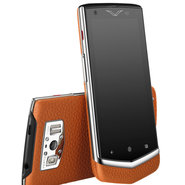- About
- Subscribe Now
- New York,
November 11, 2013

In response to how smartphones have altered the way consumers shop, a new report by Forrester Research indicates that 66 percent of luxury consumers are more willing to interact with a sales associate equipped with a mobile device.
The “A New Generation of Clienteling” report discovered that some consumers do not feel that sales associates are the best source of product information. With the role of sales associates changing, bringing mobile technology into stores may help re-establish trust while creating an enhanced experience for consumers.
"Only 19 percent of consumers believe sales associates have relevant information," said Adam Silverman, principal analyst at Forrester Research, San Francisco. "That’s very shocking and that’s clearly an indicator that the sales associate role needs to change.
"In the findings, consumers prefer to interact with mobile-equipped sales associates and trust that information given more," he said. "A third of the population has a desire to work with mobile-equipped sales associates.
"Coupling this with using digital in-store technology was not surprising, meaning that consumers are eager to work with digitally-enabled associates and are also interested in in-store technologies, like product configurations and magic mirrors."
Forrester surveyed more than 4,500 U.S. online adults for the report.
Trusted shopping companion
With the growing presence of smartphones, consumers can access what sometimes feels like an unlimited amount of information to help make purchasing decisions. Historically, the exchange of product information occurred between sales associate to consumer.
Today, only 24 percent of consumers feel that in-store associates are able to give the best product information.
Now, armed with a smartphone, consumers have the ability to price check, shop around and increase product knowledge on their own. The report discovered that 34 percent of consumers surveyed have done in-store research on a product’s price to ensure that the sales associate was not overpricing them.
Burberry's product page on Amazon.com
The report found that there is an age distinction between consumers who use mobile devices while in-store to research an item prior to purchase. Fifty-seven percent of consumers ages 18-24 reported this behavior while 51 percent of consumers ages 25-34 reported doing the same.
Above all, consumers still desire an engaging in-store experience with their luxury brand of choice. The report shows that 71 percent of U.S. online consumers feel that the in-store experience is an important element.
This high percentage should signal to brands that the physical environment is still an attractive and lucrative platform in which to engage consumers. Retailers now must evaluate how to implement digitally-accessible touchpoints in-store.
Retail in the future
The Forrester report notes that as technology continues to reinvent the retail space, retailers should invest in omnichannel capabilities that will enrich the relationship between consumer and sales associate.
StyleWhile app on Saks Fifth Avenue
These omnichannel capabilities can range from product and inventory information that consumers can access. The advances will create a “reactive role” for sales associates rather than a “proactive” one.
Forrester’s report predicts that within the next two years, 50 percent of retailers will have visible inventories online to better meet consumer expectations.
In response to 35 percent of consumers expecting mobile check out, more mobile devices will be seen on sales floors to improve efficiency, satisfaction and ensure that the sales associate is well-versed in product information.
In addition, real-time analytics will enter the store to provide sales associates with insights into the consumer wants.
Lastly, location-based marketing will serve to drive sales by using mobile strategies, such as text messaging that entice a consumer and guide purchases while in-store.
In-store use of digital will also include “product visualization tools and configurations” to help in purchasing. The report revealed that 78 percent of consumers interested in sales associates equipped with mobile devices were also interested in visualization technologies.
With this change in shopping habits and technology in mind, retailers will need to adapt the role of a sales associate.
"A digital experience is growing in importance," Mr. Silverman said.
"I think there’s a growing need for a sales associate that is highly trained and capable when it comes to leveraging digital technology to facilitate engagement," he said. "The sales associate will need to use enterprise data to fully maximize engagement with consumers.
"Their role will need to pivot from providing information to facilitating engagement to meet the needs of consumers in-store."
Final take
Jen King, editorial assistant on Luxury Daily, New York
Share your thoughts. Click here